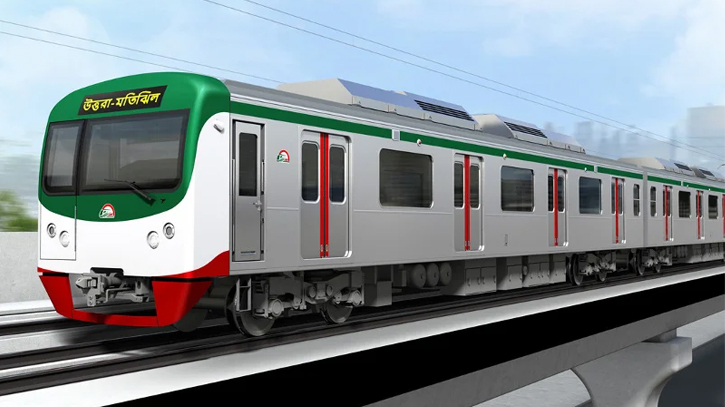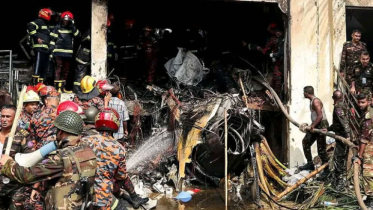
Photo : Collected
The metro rail has quickly gained popularity within a month of its full-fledged operation. This metro rail system has brought considerable relief to city life by alleviating the daily struggles of citizens. However, several incidents have already raised concerns about the metro rail services.
Frequent sudden stoppages of metro services during rush hours due to trivial reasons, along with complications in the operation of railway compartment doors, have sparked discontent among passengers.
Authorities have said that interruptions in the electric train journeys occur due to mechanical faults or other reasons. However, the occurrence of untoward incidents in the Metro rail is attributed to the demands of experts, inefficient management of skilled manpower, and operational procedures.
Regular passengers claim that individuals who have suffered business losses due to the introduction of the metro rail are attempting to sabotage the service in various ways.
On Wednesday, this reporter spoke to several regular commuters on the metro rail. They all emphasised that trains are among the most popular public transport options in various countries worldwide. Despite the high demand in our country, trains have been considered a loss-making sector, largely due to the influence of a powerful syndicate of bus owners who have held Bangladesh Railway hostage.
They also expressed concerns that with the introduction of the Metro rail, many bus routes within the city are experiencing losses due to reduced passengers. Consequently, it would not be surprising if these bus owners sought to discredit the metro rail. The government should pay special attention to this issue, although many of these bus owners are known to be close to the government.
The metro rail has four automatic vending machines at every station for purchasing single journey tickets. Passengers can acquire tickets themselves by depositing money into these machines. However, complaints about these machines have been ongoing since their launch. Almost every day, the machines remain inactive for some time at one or another station. Currently, all metro rail stations from Uttara to Motijheel remain open until late at night, increasing passenger pressure and exacerbating issues with these machines.
In response to these concerns, Mohammad Abdur Rauf, Company Secretary (Joint Secretary) of Dhaka Mass Transit Company Limited, told The Daily Messenger, “The machines are not completely non-functional. Multiple commands are also issued by passengers, which can delay the process. Additionally, the machines take time to process cash insertions. Furthermore, they may stop automatically due to repeated insertion of old notes."
“Many times, the card tray storing the 500 cards (tickets) runs out, which requires the installation of a new tray or re-cutting of tickets. If there is a genuine issue with the machine, such as a software malfunction, we are actively working on a solution. Hopefully, this problem will be resolved soon,” he added.
According to transport experts, metro rail systems around the world are operated by professional manpower, either under government or private supervision. Skilled manpower is crucial in ensuring efficient operation. As the concept of the metro rail is relatively new in Dhaka, there is a shortage of skilled manpower, leading to management errors from the outset. While problems may arise in metro systems worldwide, the faults in the Dhaka metro are more pronounced.
Experts have raised questions about the country’s government management system in this regard. They question the rationality of managing the Metro rail with government manpower when the government has benefited from privatising airports and ports. They advise stakeholders not to hesitate in taking effective steps towards the proper management of the Metro, which is the people’s hope.
Dr. Shamsul Haque, Professor at Bangladesh University of Engineering and Technology (BUET) and a transport expert, told The Daily Messenger, “There is no other example of running a metro with a mobile workforce like the Dhaka Metro Rail. Developed countries do not take the risk of operating a metro with newly trained manpower. They are well-versed in the science behind it.”
“But the metro rail authorities are reluctant to admit it. This is because they lack extensive knowledge. They are focused on recruitment and procurement and fail to grasp anything beyond that. They disregard scientific principles,” he added.
Sources related to the MRT-6 project of Dhaka Mass Transit Company Limited (DMTCL), the developer and operator of the metro rail in Dhaka, said that the section from Uttara to Agargaon was inaugurated on December 28, 2022. The metro rail was opened to the public on December 29. A day later, the metro was shut down after a flying lantern got caught in an electric wire.
Then, at the beginning of last year, train services were halted after clothes left to dry on the roof of a nearby building fell onto the electric wires. Following that incident, train movement was halted temporarily due to stone pelting and the breaking of the metro's glass. Additionally, mechanical faults led to interruptions in movement several times last year. Sometimes the metro was closed for 30 minutes, sometimes more or less.
Moreover, on January 23 this year, a miscreant threw a satellite TV cable onto the metro wire, deliberately disrupting the movement. The culprits are still at large. Despite the modern CCTV systems installed on these electric vehicles, they could not assist in identifying the miscreants.
On February 4, the metro rail remained closed for 15 minutes due to a mechanical fault. And on February 14, a kite halted the service for 35 minutes. In this incident, the police arrested 2 adults and sent them to jail, while 6 minors were released to their families from the police station on bail. Last Saturday, the service was interrupted for about 1 hour and 17 minutes after the automatic doors of the metro rail got stuck.
Professor Dr. Adil Muhammad Khan, President of Bangladesh Institute of Planners (BIP), told The Daily Messenger, “Metro rail systems are managed by both public and private entities worldwide. Since the government management in Bangladesh does not provide satisfactory services, there would not have been as much crisis if the responsibility for managing the metro had been given to the private sector.”
He further mentioned, “Errors occur in other metro systems worldwide, but not to the extent seen in Dhaka. Incidents are happening here similar to other organisations or projects in the country. Inefficient leadership in the metro needs to be addressed to prevent setting a negative precedent in the country.”
When questioned about these issues, M.A.N. Siddique, Managing Director (MD) of DMTCL, told The Daily Messenger that the Dhaka Metro Rail is managed in accordance with international standards and there are no negative aspects to it.
It is noteworthy that the government has invested Tk 33,472 crore in implementing the country’s first electric vehicle or metro rail project. By 2035, the government plans to launch 5 Metro rail s in Dhaka. As part of this plan, the implementation of the Uttara to Motijheel section of MRT-6 has been completed, and work on MRT-1 and MRT-5 has commenced. Efforts are underway to expedite the remaining projects.
If all the projects are completed, a 130 km metro network will be established in Dhaka, consisting of 69 km above ground and 61 km underground. The government aims to address Dhaka’s traffic congestion and promote an environmentally friendly public transport system. Experts have advised authorities to pay special attention to this initiative to ensure it does not fail due to incorrect and inefficient management by the metro authorities.
Messenger/Fameema








